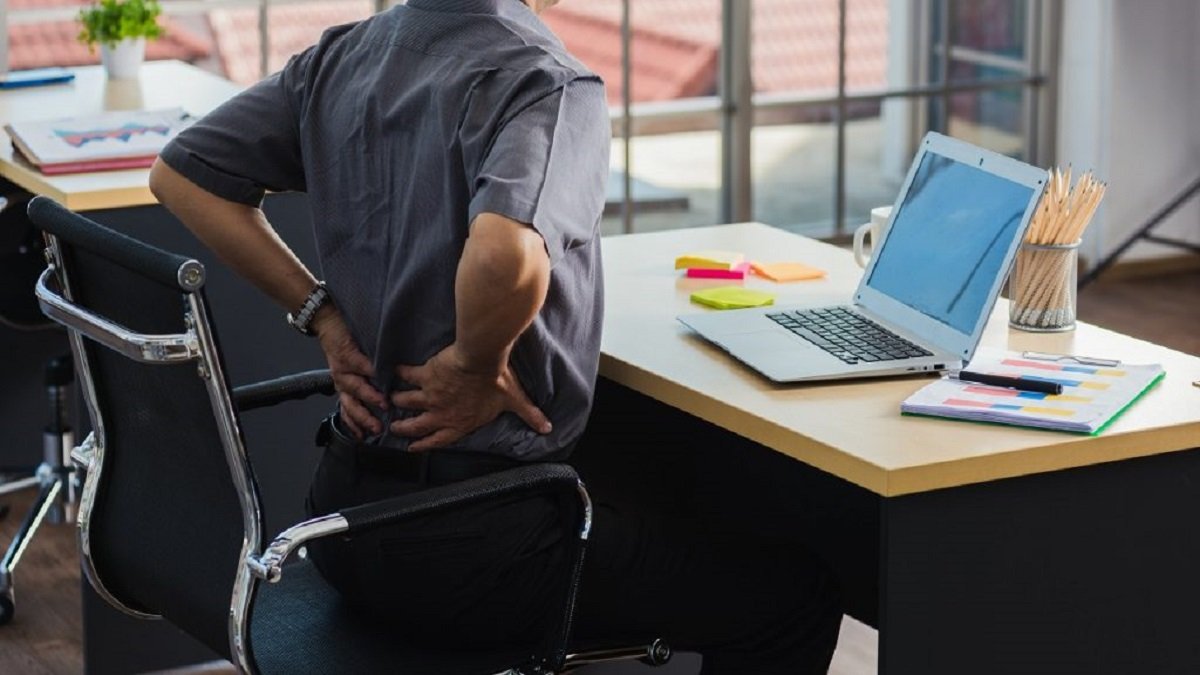Our health is being sacrificed as a result of our collective enslavement to our workstations. All of us were taught as children that “all work and no play makes Jack a dull boy,” but as we became older, we somehow forgot. We don’t have much time to glance away from our devices or follow health tips for people since we have a lot on our plates and high goals to accomplish.
Some of us are so preoccupied that we hardly have time to shift positions. In the hopes that all of our hard work will pay off in the form of raises and promotions, we even have lunch at our desks. Yes, the bills are paid by our lengthy sitting desk jobs, but our health suffers as a result. We discover a new body component that hurts every day as a result of our sedentary lifestyle.
Your extended sitting hours at work are the reason behind your frequent complaints of stiff neck and back discomfort. You may not know this, but spending a lot of time at your desk invites illnesses and other health problems.
How To Combat Problems Arising From Sitting Longer

1. Move Every Hour
Including frequent pauses in your daily routine is one of the easiest but most effective health tips for people to counteract the consequences of extended sitting. Long durations of sitting seem to slow down metabolism, which may hurt the body’s capacity to control blood pressure and blood sugar. It’s advised to walk, stretch, or stand up for at least five to ten minutes per hour to help counteract this.
Frequent rest improves productivity and mental alertness in addition to preserving physical health. You may lessen the pressure on your muscles and joints and increase circulation by taking short walks around the workplace or even standing while you chat on the phone. Incorporating this habit into a hectic schedule might be accomplished by setting a timer to remind you to take pauses.
2. Do Ergonomic Adjustments In Workspace for Better Posture
To reduce the health concerns linked to extended sitting, it is important to have a workstation that is ergonomically adjusted. The term ergonomics describes the process of creating a work environment that is comfortable and efficient for the user. Maintaining good posture requires an ergonomic chair with lumbar support, height adjustment, and a soft seat cushion.
Apart from a chair that provides support, the arrangement of your computer’s keyboard, mouse, and display has equal significance. Approximately an arm’s length away, the top of the display should be at or slightly below eye level.
Your elbows should be at a 90-degree angle, and your wrists should stay straight while you place the keyboard and mouse. This configuration promotes a more organic sitting position and lowers the danger of repetitive strain injuries.
3. Practice Good Posture
The aches and pains that often follow extended periods of sitting may be avoided with proper posture, which is one of the ways to stay healthy when sitting. Leaning forward or slouching may put undue pressure on the shoulders, neck, and back, causing pain and perhaps long-term problems.
Sit with your back straight, shoulders relaxed, and feet flat on the floor to preserve good posture. Your hips should be positioned slightly higher than your knees, and your knees should be at a 90-degree angle.
By using your core muscles while seated, you may lessen the strain on your lower back and preserve a neutral spine posture. Exercises for improving posture, such as shoulder blade squeezes and seated pelvic tilts, may help build stronger supporting muscles and facilitate proper sitting all day.
4. Stay Hydrated
Although it’s often forgotten, maintaining proper hydration is crucial to reducing the harmful consequences of extended sitting. Sitting for extended periods may aggravate the symptoms of dehydration, which include weariness, cramping in the muscles, and a loss of focus.
As you’ll need to get up to replenish water or use the restroom, drinking enough water throughout the day promotes more frequent breaks and helps sustain energy levels and metabolism.
Make sure you drink enough water by keeping a bottle close at hand and taking frequent, little sips. For those who want a little more variation, herbal teas and infused water are also excellent choices. Steer clear of sugary or caffeinated drinks in excess since they might cause dehydration and set off a vicious cycle of energy dips.
5. Engage in Regular Physical Activity
Although resting and correcting posture are important health tips for people, they cannot replace consistent physical exercise. It’s advised to counteract the hazards of extended sitting by exercising for at least 150 minutes a week, moderate to strenuous. Exercises like swimming, cycling, running, and walking help develop muscles, improve cardiovascular health, and increase general fitness.
Strength training activities are advantageous as well since they increase muscle mass and enhance metabolism. Exercise, even brief bursts like a fast workout after work or a brisk stroll during lunch breaks, may significantly lower the health risks associated with sedentary behavior.
6. Invest In A Standing Desk
The use of standing workstations has increased as a means of cutting down on sitting time. With the aid of these desks, you can switch between sitting and standing during the day, which may enhance energy, help with posture, and lower your chance of developing chronic illnesses linked to extended sitting.
It’s crucial to have proper posture while using a standing desk and to avoid standing for extended periods since this might cause lower back and leg pain. To lessen the pressure on your legs and feet, think about using an anti-fatigue mat.
You should also wear supportive, comfy shoes. Increase the amount of time you spend standing gradually to give your body time to adapt. To keep your muscles working, move your body by changing your weight or doing calf raises. It is one of the best health tips for people.
7. Stretch and Strengthen Often
Frequent strengthening and stretching activities may help mitigate the harmful consequences of extended sitting, which is one of the ways to stay healthy when sitting. While strengthening exercises concentrate on the muscles that maintain proper posture and prevent discomfort, stretching aids in increasing blood flow, reducing muscular tension, and improving flexibility.
Stretches that concentrate on the lower back, hamstrings, and hip flexors should be prioritized since prolonged sitting often causes tightness and weakness in these regions. Stretches for the hip flexors, sitting hamstrings, and spinal twists are very helpful. Planks, bridges, and leg lifts are examples of strengthening exercises that may improve core stability and promote good posture.
8. Mind Your Diet
Maintaining energy levels and general health depends greatly on diet, particularly for those who spend a lot of time sitting down. A well-proportioned diet full of fruits, vegetables, lean meats, and healthy grains gives your body the nourishment it needs to operate. Steer clear of processed meals, sugary snacks, and too much coffee to avoid energy drops and keep your attention all day.
Aside from portion control, sitting for extended periods of time might slow down metabolism and result in weight gain. Blood sugar levels may be regulated, and overeating can be avoided by eating smaller, more frequent meals. It is one of the most essential health tips for people.
9. Prioritize Mental Well-being
Long periods of sitting may have a deleterious effect on one’s mental and physical health. Sitting for extended periods may lead to stress, anxiety, and melancholy, especially in high-pressure job settings. For general well-being, mental health must be prioritized.
Including mindfulness techniques that promote attention and stress reduction, such as yoga, meditation, or deep breathing, might be beneficial. You may relax and refocus your thoughts by shutting your eyes and taking a few deep breaths at your desk or by taking brief pauses to go outdoors and breathe in some fresh air. It’s also critical to have a good work-life balance.
Consequences of Extended Sitting
Extended periods of sitting might be harmful to your health. It puts your health in danger by gradually weakening and reducing the strength and flexibility of your body’s components, but these can be countered by health tips for people. These are the most common negative effects of prolonged sitting.
Back Issues: Have you ever had back discomfort as a result of prolonged sitting? You have, of course. Because they don’t provide your spine with optimal support, those office chairs are bad for your back. You quickly begin to have back issues that negatively impact your health.
Stiff Neck & Shoulders: When the workload begins to mount, your neck and shoulders take the brunt of the tension. But there are other factors as well. Extended periods of looking at a screen might also cause stiffness. Your spine is impacted by working for almost half of the day.
Tight Hips: Prolonged standing or sitting in one position may strain your hip flexors. This is because prolonged periods of sitting lead your muscles to become tense and inactive. These muscles get shorter and weaker with time.
Weak Legs & Glutes: One of the adverse effects that shouldn’t surprise you is leg ache from prolonged sitting. The primary cause of tension and edema in the veins is fluid accumulation brought on by extended sitting. Spider veins or varicose veins may result from this. Additionally, tingling or numbness in the legs and feet is possible.
Additional Health Risks: Prolonged sitting may increase your chances of obesity and cancer, among other major health problems. Long periods of sitting raise blood pressure and cholesterol, increasing your risk of cardiovascular disease.
FAQ
Q: What occurs if we spend a lot of time sitting?
A: The big leg and gluteal muscles might atrophy and deteriorate as a result of prolonged sitting. These powerful muscles are necessary for both walking and for maintaining your balance. You run a higher risk of hurting yourself during exercises and from falls if these muscles are weak.
Q: How much time is a healthy sit?
A: The following benchmarks establish an individual’s chance of experiencing health issues as a result of prolonged sitting, according to the nonprofit organization.
Low Risk: Less than 4 hours of sitting a day.
Moderate risk: 4–8 hours of sitting each day.
High risk: Eight to eleven hours a day of sitting.
Q: Does prolonged sitting result in back pain?
A: Generally, extended durations of sitting will make your back discomfort worse. This includes activities that we are all too acquainted with these days, including driving, watching movies, and working from home. The longer we sit, the worse our posture becomes since the human body is not designed to sit for extended periods of time.











